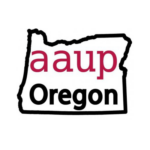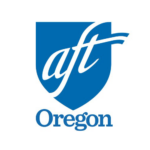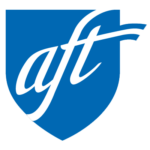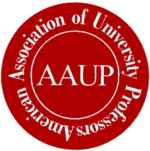Community & Politics
Contact Us
Meet the Chair of the Politics Committee
Dan Webb Howard
Chair of the Politics Committee
Dan Webb Howard is an instructor in the Lundquist College of Business, where he teaches business law and negotiations courses. He began teaching at UO in 2019, following an 18-year legal career that spanned a wide range of practice areas, including employment law, tax litigation, and immigration law.
In addition to serving as the Chair of Politics, Dan serves on the bargaining team, Dan is a member of UA’s Grievances & Contract Administration Committee (GCAC).
Email Dan
State & National Affiliate Endorsements
AAUP Oregon 2024 Candidate Endorsments
The AAUP Oregon Legislative and Political Committee, which is composed of representatives from each of their collective bargaining chapters, asked each candidate about topics ranging from funding for higher education, Board of Trustee transparency, student debt, and general attitudes toward education.
After reviewing the numerous responses, AAUP Oregon has extended endorsements to 32 candidates we believe will be champions of higher education in Salem. You can find those endorsements here.

AFT-Oregon 2024 Endorsments
The Politics, Policy, Legislation, and Solidarity (PPLS) Advisory Council, a group of fellow AFT-Oregon members from across the state, has established processes to vet and endorse legislative candidates while continuing to build relationships with known champions of education.
AFT-Oregon has endorsed in the statewide election and Oregon Legislature. You can find those endorsements here.

AFT National 2024 Endorsments
AFT has endorsed in the presidential and federal congressional election. You can find those endorsements here.

Additional Information

Oregon AFL-CIO and AFT-Oregon
2023 Legislative Session Reports
Testimony provided by UAUO members during the 2023 Legislative Session
Previous Updates
2023 Legislative Session Endorsements
The AAUP Oregon Legislative Committee is joined by the AAUP Oregon Executive Committee and the leadership of each collective bargaining chapter in supporting the following bills:
Relating to unused accumulated sick leave of public employees. Directs Oregon Department of Administrative Services to establish a procedure by which employees of certain public employers who are leaving employment may donate unused accumulated sick leave to be used by other employees of public employers.
Relating to the Oregon Forest Resources Institute. Transfers revenue from levy of additional privilege tax under forest products harvest tax to Forest Research and Experiment Account that is appropriated to Higher Education Coordinating Commission for distribution to Oregon State University.
Relating to behavior related to interscholastic activities; declaring an emergency. Requires public universities to develop specified policies and accountability mechanisms for behavior at interscholastic activities, including sporting events.
Relating to Portland State University; declaring an emergency. Requires Portland State University, subject to sufficient moneys being appropriated, to enhance the state’s capacity to educate public mental health and addiction treatment providers by July 1, 2028, by materially increasing the number of graduates from relevant degree programs.
Relating to signed authorizations designating exclusive bargaining representation; declaring an emergency. Requires Employment Relations Board to develop guidelines and procedures for authorizations designating bargaining representatives of the bargaining unit to be prepared and signed electronically.
Relating to health care benefits for part-time faculty members at post-secondary institutions of education; declaring an emergency. Requires that dental and vision are included in health benefits available to part-time faculty members.
Relating to governance structures at post-secondary institutions of education; declaring an emergency. Alters composition of governing boards of public universities by increasing the number of student, faculty, and nonfaculty staff members and requiring these members to be voting members of the board.
Relating to minimum wage rates; prescribing an effective date. Provides minimum wage rate beginning July 1, 2024.
Relating to part-time faculty. Establishes a uniform method for calculating eligibility of part-time faculty members of community colleges or public universities for certain health care, retirement, and other benefits.
Relating to age-based employment discrimination. Clarifies the meaning of “because of age” in employment discrimination law.
Relating to post-secondary students working at nonprofit corporations; declaring an emergency. Establishes pilot program at Portland State University and Eastern Oregon University to enhance hiring of public university students by nonprofit organizations.
Relating to sick leave for mental health. Expands allowable uses of sick leave provisions to include leave for employee’s mental health and for the care of mental health needs of employee’s family member.
Relating to funding post-secondary education; declaring an emergency. Appropriates $5,000,000 to Higher Education Coordinating Commission for allocation to expand the scope and community reach of college access and success programs at public universities and community colleges.
Relating to the Oregon Forest Resources Institute. Transfers revenue from levy of additional privilege tax under forest products harvest tax to State Forestry Department Account for distribution to Oregon Forest Resources Institute Fund, Oregon Forest Land Protection Fund and Higher Education Coordinating Commission for Oregon State University Extension Service to implement Oregon Environmental Literacy Plan.
Relating to the composition of higher education boards. Requires governing board at each public university to include a graduate student as a voting member if the university has more than 400 graduate students or if graduate students comprise more than 15 percent of the total student body.
Relating to the status of student workers under the Oregon Public Service Retirement Plan. Makes certain graduate and post-graduate student workers eligible employees for purposes of the Oregon Public Service Retirement Plan.
Relating to combating hunger at post-secondary institutions of education; declaring an emergency. Authorizes Higher Education Coordinating Commission to award “Hunger Free Campus” designation to public universities and community colleges that demonstrate required actions taken to combat hunger.
Relating to tuition benefits connected to disabled veterans; declaring an emergency. Expands tuition benefits available to disabled veterans to permit veteran who is Oregon resident and 80 percent or more disabled, and spouse and child of a disabled veteran, to have tuition waived for enrollment in a vocational program or associate degree, baccalaureate degree, or master’s degree programs at community colleges, public universities and Oregon Health and Science University.
Relating to part-time faculty at post-secondary institutions of education; declaring an emergency. Requires public universities and community colleges to pay part-time faculty at the same rate, on a per-hour basis, as a public university or community college pays full-time faculty to prepare for and teach courses.
Relating to workers’ compensation claims; declaring an emergency. Requires subject employers to adopt policy allowing subject workers paid time off during shift to receive medical services related to worker’s compensable injury or occupational disease.
Relating to the composition of governing boards at post-secondary institutions of education. Requires that faculty and nonfaculty staff members of governing board at public universities are voting members of the board.
Relating to transcript policies at post-secondary institutions of education. Prohibits post-secondary institutions of education that are based in Oregon from refusing to provide a transcript to current or former students because the student owes debt to the institution.
Relating to funding programs at Oregon State University; declaring an emergency. Appropriates money from General Fund to Higher Education Coordinating Commission for allocation to Oregon State University to fund agricultural experiment stations and branch stations, Oregon State University Extension Service, and Forest Research Laboratory.
Relating to the cost of health care. Requires insurer, pharmacy benefit manager, Public Employees’ Benefit Board, Oregon Educators Benefit Board, and health care service contractor to count payments made by or on behalf of enrollee for costs of certain prescription drugs when calculating the enrollee’s contribution to the out-of-pocket maximum, deductible, copayment, coinsurance, or other cost-sharing for drugs.
Relating to post-secondary education for individuals with disabilities; declaring an emergency. Requires Higher Education Coordinating Commission to work with Portland State University and community colleges to establish post-secondary programs for youth with intellectual and developmental disabilities.
Relating to mandatory overtime. Permits employees of certain state agencies to refuse to work additional mandatory overtime shifts scheduled by the employer when an employee has already worked mandatory overtime in the same month.
Relating to investigations of workplace discrimination at state agencies. Directs the Department of Human Services to develop or acquire and maintain an information system for tracking investigations related to allegations of workplace discrimination and harassment.
Relating to surplus revenue disposition; prescribing an effective date. Discontinues return of surplus revenue refunds to taxpayers.
Proposing an amendment to Oregon Constitution relating to surplus revenue. Proposes an amendment to the Oregon Constitution to cease the requirement of returning surplus revenue to personal income taxpayers.
Relating to instructors at institutions of higher education; declaring an emergency. Requires each community college and public university to have at least 45 percent of the total number of credit hours offered taught by full-time employees during the 2024-2025 academic year, at least 55 percent of the total number of credit hours taught by full-time employees during the 2025-2026 academic year, at least 65 percent of the total number of credit hours offered taught by full-time employees during the 2026-2027 academic year and at least 75 percent of the total number of credit hours offered taught by full-time employees every academic year thereafter.
Relating to students at post-secondary institutions of education. Requires Higher Education Coordinating Commission to conduct a study to determine the best method for increasing access to public higher education for all Oregonians and for increasing levels of institutional and financial support provided to students enrolled at public post-secondary institutions of education.
Relating to collective bargaining over matters concerning on-the-job safety; declaring an emergency. Modifies the definition of “employment relations” for purposes of collective bargaining to include safety issues and staffing levels that have a significant impact on the on-the-job safety of employees.
Relating to higher education governance. Requires each public university to submit an annual report to interim committees of the Legislative Assembly related to education that details the degree to which public university provides specified opportunities for participation in governance processes.
Relating to higher education governance; declaring an emergency. Changes composition of governing board for public universities.
Relating to binding arbitration for purposes of public employee collective bargaining. Modifies procedures required for binding arbitration for certain public employees.
Relating to sexual misconduct at institutions of higher education: declaring an emergency. Establishes Sexual Misconduct Survey Council.
Relating to employees’ rights to refuse to perform certain work assignments. Provides employees with the right to refuse to perform a task assigned by an employer under certain circumstances.
Relating to minimum conditions of employment. Provides statewide minimum wage rate beginning on July 1, 2024.
Relating to marginal income tax rates; prescribing an effective date; providing for revenue raising that requires approval by a three-fifths majority. Modifies personal income tax brackets.
Relating to bereavement leave; prescribing an effective date. Permits an employee to take bereavement leave to grieve the loss of pregnancy due to miscarriage.
Relating to compensation for accrued leave upon termination of employment. Requires employers who provide sick leave, vacation leave, or personal business leave benefits to employees to compensate employees for all earned but unused accrued leave when employment terminates.
Relating to higher education accreditation policies. Expands the list of schools and entities included in the definition of “diploma mill.” Defines post-secondary accrediting agency to comply with current federal regulations recommending ending the concept of regional accreditation.
Relating to financial aid. Makes Oregon Promise program grants available to students at community colleges, public universities, Oregon Health and Science University, and not-for-profit institutions of higher education in the state.
Relating to higher education; declaring an emergency. Requires Higher Education Coordinating Commission to establish a grant program for the purpose of supporting organizations to expand the scope and community outreach of college access and success programs.
Relating to civil rights; declaring an emergency. Prohibits, in specified areas of law, discrimination or harassment against persons based on caste.
Relating to the financial administration of the Higher Education Coordinating Commission; declaring an emergency. Appropriates money from General Fund to Higher Education Coordinating Commission for certain biennial expenses.
Proposing an amendment to the Oregon Constitution relating to an enumeration of equal rights. Proposes an amendment to the Oregon Constitution to enumerate examples of rights, the denial or abridgment of which would violate the existing constitutional guarantee of equality of rights.
For additional information on the bills the AAUP Oregon Legislative Committee supports or opposes, please contact AAUP Oregon Interim Organizing Director Victor Reyes ([email protected]).
2022 Short Legislative Session
Oregon lawmakers adjourned the 2022 short Legislative Session on March 4, which began February 1.
The work of the Legislature was dominated by the continued response to the pandemic, deliberating over farmworker overtime policy, negotiating the Governor’s workforce proposal, addressing housing affordability, and distributing $1.4 billion in new spending.
Major leadership changes took place this session and there are many more to come for the 2023 session. Rep. Dan Rayfield, from Corvallis, finished his first session as House Speaker, following the resignation of Tina Kotek as she pursues her campaign for Governor. Rep. Julie Fahey, who represents parts of Eugene and Junction City, served House Majority Leader and Rep. Vikki Breese Iverson from Prineville as House Minority Leader.
The surging revenues allowed for lawmakers to make investments across the board.
University of Oregon Investments
-
- Over $10 million to purchase scientific equipment for Building 2 of the Phil and Penny Knight Campus for Accelerating Scientific Impact. This state investment will support the build-out of a real-time, machine-learning fueled integrated tissue characterization and bioprinting facility. This will catalyze research to better understand the interactions of cells within tissues and to construct tissues and organs that open new avenues in personalized medicine.
- $4.5 million to support the work of Professor Doug Toomey and the Oregon Hazards Lab (OHAZ) Wildfire Camera Network. ALERTWildfire provides access to state-of-the-art fire cameras to help firefighters and first responders monitor fire conditions quickly and accurately enabling them to send appropriate resources and send evacuation notices as needed. This is increasingly important with more extreme fire seasons facing our state in recent years.
- $700,000 to support the College of Education’s Oregon Child Abuse Prevalence Study expansion. This will support the most comprehensive child abuse prevalence study in the US and will provide data to help Oregon policymakers direct funding appropriately. The Oregon Child Abuse Prevalence Study, the first and most innovative child abuse prevalence and youth voice project in the U.S., will serve as the gold standard for prevention measurement.
Investments for all Oregon Public Universities
-
- A $30 million increase in Capital Improvement and Renewal bonds designed to address cost escalations on previously approved capital projects. For UO, the ask was for $15 million to cover cost escalation for Huestis Hall (approved by legislature in 2020) and the Heritage Project, consisting of University and Villard Halls (approved by legislature in 2021). Given the sharing formula with the other universities, UO is likely to receive around half of that amount, $7.6 million.
- $19 million for the Tribal Student Grant Program. This will provide financial aid grants to students who are enrolled in a recognized Native American tribe.
- A $17.24 million increase in funding for the PERS Employer Incentive Fund. The program encourages PERS employers to make a lump-sum payment to pre-pay what they currently owe, reducing their overall payments by avoiding additional interest. When a match from the state is combined with these payments it effectively reduces employers’ contribution. A win-win for both the employee and employer.
- $7.5 million for the Strong Start / Summer Bridge Program. UO will receive roughly $1.5M of this funding. In 2021, the Legislature provided one year of funding for these programs which assisted students in the transition from high school to college, with a focus on those most impacted by remote instruction and the COVID-19 pandemic. This investment will support the program for 2022 for high school graduates who did not enroll in college or enrolled and were adversely impacted by the pandemic. Program elements to assist these students include intensive academic supports in math and writing, academic advising, note taking skills, time management, early move-in to campus, peer mentoring, tutoring, and financial literacy.
- The Oregon Department of Veterans’ Affairs is giving $600,000 in grant funding to 15 colleges and universities across the state to primarily support the institutions’ Campus Veteran Resource Centers and bolster other services for Oregon student veterans. UO was awarded $50,600 of these grant funds.
Policy Bills Affecting University of Oregon
-
- SB 1505: Expanding the Rights of Student-Athletes: In 2021, with the passage of SB 5, Oregon became one of the earliest states to clear the way for student-athletes to benefit from the use of their name, image, and likeness (NIL). This bill expands Oregon’s NIL law by requiring producers to provide royalty payments to student-athletes if their individual name, image, or likeness is used on a jersey, trading card, in a video game or other such setting. Oregon will become just the second state in the country to provide this benefit to student-athletes.
- SB 1522: The omnibus education bill. Among other things, it includes in-state tuition eligibility for Afghan refugees, in-state tuition provisions for veterans, provides access to educational programs at correctional facilities, modifies eligibility for Oregon Promise Grant, and makes technical fixes to administer part-time faculty health insurance.
University Activities/Committees
Task Force on Student Success for Underrepresented Students (HB 2590 of 2021): Since being appointed last fall, the Student Voices Task Force has held a handful of public meetings, as well as private planning committee meetings. Kimberly Johnson and Jim Brooks from UO have attended planning meetings, providing feedback on the task force’s plans to travel to campuses across the state to meet with students, university staff, community-based organizations, and local business leaders. While subject to change, the task force plans to visit the Willamette Valley on April 13th and 14th, with one day dedicated to community college stakeholder meetings and visits, and one day dedicated to public university stakeholder meetings and visits. Notably, UO is the only institution that has had a student testify during every public meeting.
Higher Education Coordinating Committee: The Senate recently confirmed Governor Brown’s appointments of new Commissioners to the HECC and university Boards of Trustees. HECC appointee terms begin March 1, 2022 and include former State Senator Richard Devlin who will serve in the position currently held by Commissioner Larry Roper; PSU student Motutama Sipelli will serve in the new graduate student position; and PSU employee Aislyn Matias will serve in the position currently held by Enrique Farrera.
Other Major Investments from the 2022 Legislative Session
Housing: $400 million to respond to and prevent homelessness. Investments to help Oregonians for more shelter capacity, rapid rehousing, resource referrals and housing stability. Local governments will receive grants for shelter capacity, hygiene needs and outreach. This funding will also go towards innovative solutions, like Project Turnkey 2.0, which acquires and repurposes hotels and other buildings to convert into shelter or housing.
Workforce training: Over $200 million for a workforce training package. $95 million will be dedicated to community organizations to subsidize skill development, $20 million to expand apprenticeship opportunities, $35 million for local workforce boards, $15 million for career programs at community colleges, $45 million to OHSU to increase graduates from underrepresented populations.
Behavioral Health: $175 million to retain employees, and $100 million to increase the state’s behavioral health housing and residential treatment capacity.
K-12 Education: $150 million for K-12 summer learning with grants for enrichment activities, summer school programs, and summer community activity grants, $26 million to expand career and technical education in high schools, $5 million to increase graduation rates for black students.
Rural Oregon: $100 million on rural Oregon infrastructure projects including fairgrounds, wastewater treatment systems, and other public works.
Child Care: $100 million for child care worker retention and recruitment and subsidies for low-income families.
Climate Change: $100 million for climate resilience dedicated to electric vehicle incentives, making homes more efficient, solar panel rebates and drought resiliency.
2021 Legislative Session: Not too bad...
2021 Legislative Session: Not too bad…
No major walkouts or other shenanigans. In other words, we actually got down to business. With a healthy budget to lean on, UAUO (myself and President Chris Sinclair) collaborated with UO and the President’s office to make the final push for the Public University Support Fund (PUSF; $900m) and the Oregon Opportunity Grants (OOG; $200m), among other asks, and we got what we asked for.
We also finally got through the Part-Time Faculty Health Care bill. Senate Bill 551 guarantees faculty who teach part-time across multiple institutions will now be covered when they get sick or injured. We also succeeded in getting through the HECC Voting Rights bill, Senate Bill 712. Now faculty, staff, and, for the first time, graduate employees will be represented with votes on the HECC. This change will secure a more equitable voice for critical perspectives and experiences when setting higher education policy in Oregon.
An important Bill for stepping up the legislative game on how best to support students also got through. House Bill 2590, the Student Voice bill, passed as well. This bill makes sure that on-the-ground faculty and students have the ear of legislators. We’ll have to keep an eye on this at our institution to make sure legislators hear the challenges our students, especially first-generation students and those from communities historically marginalized in higher ed, are facing.
Finally, the last-minute push to move Senate Bill 854 (Boards of Trustees Reform) forward stalled at the end of session. However, robust testimony from across the state made it clear that this work will continue. There will be some formalized conversations and actions moving forward to act on some of the issues brought up and you can be sure Board governance will be a priority for our state politics.
On a personal note, I’ve found this session to be one of our more productive sessions. We got some good measures through and we found some areas where we could collaborate with folks we may not normally work with to do so. I am grateful for the chance to serve as AAUP-OR’s VP of Political Action and work alongside an incredibly smart legislative committee led by Chris Parta, AAUP-OR’s government relations guru. A big thank you to Matt Burris at AAUP-OR for also running a strong push this session. If you are interested in getting into the political game at the state level, especially if you’d like to work on legislative reforms to the Boards of Trustees, hit me up and let’s talk. I’m going to stay on top of Politics for now, but we’re looking for folks to fill our political ranks. We’ve got a lot of state political work ahead of us, and UO is in the game. Let’s keep it moving.
2021 Session Summary
Part-Time Faculty Health Care
For years, AAUP Oregon has worked hard to secure benefits for the nearly 1,700 faculty members around the state without access to the same health care benefits other full-time employees have. Thanks to the tireless efforts of faculty across the state, we won! Thanks to Senate Bill 551 faculty who teach part-time across multiple institutions will now be covered when they get sick or injured.
AAUP Oregon wants to thank all the legislators, faculty, students, and staff who worked tirelessly over the last few sessions to make sure our friends and colleagues who work for multiple universities get the coverage they need.
HECC Voting Rights
After years of working to secure more equitable representation on the Higher Education Coordinating Commission, we passed Senate Bill 712. Now faculty, staff, and, for the first time, graduate employees will be represented with votes on the HECC. This change will secure a more equitable voice for critical perspectives and experiences when setting higher education policy in Oregon.
Higher Education Funding
The Public University Support Fund was funded to the tune of $900 million, which matches AAUP Oregon’s request for state funding for this next biennium. In addition to fighting for this key direct funding of our public institutions, AAUP Oregon is happy to see that the Oregon Opportunity Grant was boosted to $200 million. These pieces of public funding will ensure that Oregon’s public higher education systems continue to deliver for students, faculty, staff, and the public.
Transparency in Higher Education Governance
Like so many incidents show, Oregon’s Boards of Trustees need to be changed. From the Faculty Senate at Oregon State to the striking faculty at Oregon Tech, faculty have spoken out for more accountable and responsive university governance. We are excited to see that this crucial conversation has begun. Faculty, staff, and students in Oregon deserve Boards of Trustees with real independence and accountability to the people they serve.
Senate Bill 854, which would have created more public accountability and accessibility for Trustees did not pass this session, however, we did get a hearing on the bill. Nevertheless, we at AAUP Oregon are looking forward to continuing this conversation and are committed to making sure that governance at our public institutions of higher education is truly independent and open to the public.
To that end, we were also excited to see that House Bill 2590 (“Student Voice Bill”) passed as well. This bill makes sure that on the ground faculty and students have the ear of legislators. This kind of grassroots effort to better understand the challenges faced in higher education is critical when crafting solutions in Salem.
Spring 2021
OT-AAUP Moves Closer to a Strike
The faculty at OIT have authorized a strike and have sent their administration notification of their intent to strike. The AAUP chapter of Oregon Tech faculty overwhelmingly authorized a strike with 96% of the bargaining unit voting and 92% of those voting in favor of the strike authorization.
The faculty still hold out hope that a strike will prove unnecessary. If the OIT faculty do strike, they would be the first faculty at an Oregon university to go out on strike.
You can read more about the situation at the OT-AAUP website.
The faculty at OIT have asked their friends to sign a community support letter to the university’s president and provost. We encourage everyone to sign.
Updates from the Higher Ed Front
One might imagine in a beautiful state like ours, with its consistent Democratic majority of legislators committed to the values many of us UA members share, that we might experience some smooth sailing in virtual Salem. Well, at least when it comes to Higher Ed equity and Labor. Unfortunately, as many people of color and other marginalized groups understand, “progressive Oregon” has a long way to go…
But the fight continues…
HB2873 / SB712
Also known as the “HECC Voting Rights” Bill, Higher Ed folks have been trying to amend the Higher Education Coordinating Commission (HECC) voting rights makeup by making a total of 5 non-voting positions into voting positions; this includes the faculty representative. Typically, the faculty member has voted in previous decision making, but it has been more a de facto rather than a de jure practice. The Bill would also add a graduate student representative to HECC with full voting rights. We’ve had some really great support from legislators on this: Chief Sponsors are Senators Dembrow and Gelser and Representative Evans; Regular Sponsors include Senators Golden, Gorsek, and Prozanski and Representatives Alonso Leon, McLain, Noose, Ruize, Weber, and Wilde.
HB 2988
The “Part-time Faculty Healthcare Bill” (also carried through as HB 3007 and SB 551) creates a program which allows part-time faculty working at public institutions, including those putting together multiple part-time appointments at different institutions, to purchase subsidized health insurance from the state’s public health insurance programs. AAUP Oregon has made this a legislative priority for several consecutive sessions and is committed to expanding health care coverage to faculty at public institutions. While this simple piece of legislation seems like an “easy” one, there are considerable roadblocks keeping this Bill from becoming a reality. Fortunately, we have a strong family of collaborators and comrades strategizing a final push for this much-needed legislative action to support our part-time faculty, especially as we’ve seen the weight they’ve had to carry over the years, including and especially during Covid.
SB233
The “Transfer Bill” is another attempt by Salem to get CCs and Us on the same page when it comes to facilitating a smooth transition for students making their way through school and/or moving among schools. The idea here is to allow faculty and other on-the-ground stakeholders to form a Transfer Council; their recommendations will be signed off by the HECC with appeals processes and minority voice inputs all present. This bill enjoys some complications, particularly between some upper administrators in the Us who don’t want transfer decisions to leave their home institutions while CCs are looking to the HECC to make sure they aren’t drowned out by their big siblings.
SB 854
“The Board of Trustees Bill.” Finally. Yes, the nonsense at OSU, the memories of PSU, and the current threat at Tech have finally pushed legislators past their limits. This Bill would hopefully configure Boards of Trustees so that they focus on offering an accessible and equitable path for all students, especially those students traditionally marginalized from Higher Education. And no, football or shiny new buildings don’t attract those students. A chance to break from generational poverty and develop critical thinking skills that will ensure they thrive in this world does. You can read more at the link below, but here are some highlights:
- More, official, input from faculty and students on Board Nominees for the Governor to consider in their recommendations to the Legislature.
- More transparency by and accessibility to Board members.
- Prohibits secretary of governing board from also being a member of administration of public university, aka, checks and balances stay in check and balanced.
- Stronger appeals process for Board decisions
https://olis.oregonlegislature.gov/liz/2021R1/Measures/Overview/SB854
And speaking of the Board of Trustees, and remembering UAUO’s particularly fraught history here, we are glad to see the University Senate recommend Professor Ed Madison, SOJC Faculty member for the next Faculty Member position on the Board, especially after the way the last faculty recommendation went.
One of the very first “political” meetings I had was with Governor Brown and our fearless leader President Chris Sinclair on the Board composition and the process whereby faculty members and members-at-large are chosen. Fast forward a couple years later and I find myself along with comrade-in-arms Treasurer Bill Harbaugh testifying in Salem on the ways in which these processes are still flawed. We here at UAUO are incredibly happy to see Salem legislators step up and offer concrete changes to the Board that will undoubtedly give the rank-and-file (we who do the research and teaching and the many support professionals we rely on to do our work) and our students a small break from business-as-usual. And while my pessimistic leanings will always say, “not enough,” this Bill is hopefully an opening to something different, and dare I say, something better, for us and our students.
In closing, I hope you all see the benefit of having our local actively engaged with Salem and our Higher Ed partners and collaborators around the State. Personally, I’ve thoroughly enjoyed getting to know legislators like Marty Wilde, Theresa Alonso Leon, Courtney Neron, and Mike Dembrow who have taken the time to listen to my rants, read my pleas, and keep us and our students forefront as they seek to make this State and its Higher Education institutions do right by us.
If you are interested in joining the UAUO Politics Committee (trust me, we ain’t too formal), lemme know. Once the dust settles in June on sine die, we’ll have to see what landed and didn’t, and start the fight for the next session. Of course, if you’re feeling at the end of the AY you still got some fight in you, we will need a push to get these Bills and of course the money, to where they need to be. For more information on the current session, please visit AAUP-OR’s politics page at http://www.aauporegon.org/
In Solidarity,
Avinnash, Chair of the Politics Committee
2021 Oregon Legislative Session
Even with a minor tantrum, i.e., a mini walk-out, things are chugging along in virtual Salem, lobbyists are lobbying, special interests are special interesting, folks are finding their Bills and causes they’re gonna fight for. We’ve got no major fights or challenges on the horizon.
On the University side of things, the Part-time Faculty Healthcare Bill is moving along, as is the permanent Faculty voting rights bill in the HECC, two bills championed by AAUP-OR and AFT-OR interrupted by last session’s major walkout. We’re keeping keen eyes on bills that would affect faculty input in a potential transfer council to get some previous legislation on transfer credits cleaned up and running smoothly; unions’ ability to arbitrate without losing our shirts; and of course, money. Yes, surprise, we had more money than we thought. Yes, surprise, the damn kicker will wipe out a huge chunk. The thing is, we gotta wait. For the Feds. For May (another forecast). We here at the UO still have Fed dollars waiting to be allocated. Enrollment? Quick side note on State money, this blog is my second-favorite blog.
Sometimes it nice to take a breath when one can. Right now, nothing much to report worth getting into. Soon, we’ll have a better idea of what bills will actually have a shot of making it to the summer. I’ll have a list for you later on when there won’t be too much to scratch off. Yea, there’s lots a bills. Along with colleagues from across the state, we’ve gone through a couple hundred bills pertaining to University and faculty matter for AAUP-OR, in conversation with our administration’s lobbyists and our comrades at AFT-OR, other partners in Education, and legislators. All the AAUP-OR locals then review them and endorse them. We’re on our fifth batch of bills so far…
And yep, there’s lots of bills I could make fun of. But they’re not going anywhere and they’re stupid for a reason. I gotta say though, there were a whole lot of “reactive” legislative concepts and bills out there. Reacting to the walkout, reacting to election fears, reacting to the same old fears (redistricting, er, gerrymandering, er…), reacting. Rep. Marty Wilde gave us a long list of Bills worth looking at simply because they could easily be the start of some really thoughtful conversations about how we truly value our resources and thus one another. But y’all know I’m a cynic. But we’ll keep at it and try, if nothing at all, to keep the shenanigans at bay…
Fortunately, we’ve got some good folks on our side:
Education Committees in both the House and Senate.
And when it comes to it, we’ll probably need to hit up Ways and Means folks, i.e., the money.
I’d say hit up Gov Brown, but she doesn’t like us very much, because we (UAUO hat on) dared point out how the Board of Trustees structure has time and time again failed our faculty, staff, and students. And no, nothing exciting legislative-wise that would put caps on upper admin salaries, lower tuition for our students priced out of higher ed, and finally, finally, finally, make Athletics big shots not so big anymore by paying athletes and contributing to educational missions.
-Avinnash
Politics Chair, UAUO & VP Political Action, AAUP-OR
2020 Oregon Legislative Session
The short session kicked off this week and will be all wrapped up in early March. Given that next year’s focus will heavily center on higher education, there are some higher ed bills already in the works; bills cleaning up the K-12 legislation from last year; lots of committees and task forces to learn about stuff; some tax and revenue housecleaning; and even some diversity-related initiatives. Nothing on PERS (unless you’re a prison chaplain, then hit me up); if you’d like updates on the PERS legislation lawsuit, hit me up as well. And if you’d like to see a complete list of potential bills or like to see AAUP’s position on the Bills they’re taking on, you can email me at [email protected].
Here are some highlights:
EDUCATION:
Sets up a task force to give recommendations on how to address student housing and food insecurity.
HB4057 (Revenue)
Prohibits sports betting on college teams. Eh…don’t know about this one. AAUP is currently neutral on this, and I’d love to hear from folks what y’all think…
Students from the Republic of Palau, Republic of the Marshall Islands or Federated States of Micronesia can receive in-state tuition.
This House-sponsored Bill attempts to help students reach graduation quickly by making sure they are placed in appropriate lower-division Writing and Math courses. However, the initial Bill does not include faculty in thinking through assessment. Both the Universities and Labor are pushing for drastic amendments, if not an outright death. I think this is an issue (placement and assessment), but not something that should be legislated. However, drawing attention to the issue brings up other things worth thinking about in the legislature, like having enough student support services for students coming from K-12 institutions that did not adequately prepare them for entry into higher-ed (funding).
Authorizes all Us to offer PhDs, some Us (regionals) limited to a number of programs for an initial time period. Prohibits HECC or other state agencies from giving scholarship money to students going to predatory on-line “schools.”
This Bill from Representative Alonso León is ultimately a “listening bill” whereby a legislative task force will visit the Us and CCs in order to learn how best to serve students from under-represented communities writ large. This is a great place for the issues raised in 4128 to be taken up, rather than go right to legislation.
Here we see a repeat of the California bill meant to give student athletes a shot at earning some income. If passed without some serious amendments there’s plenty of time for the NCAA and its partners to squash it.
This is a typical short-session bill that does some cleaning up on previously passed legislation, this time, the Transfer Student Bill of Rights and Responsibilities. We’re keeping an eye on this, especially to make sure that the HECC doesn’t go too far around the Us. There’s a provision for extending some scholarships for Public Safety Officer’s children thrown in as well as an authorization for the regional Us (Western, Eastern, and Southern) to offer PhD degrees (like HB4137).
Stricter licensing process and penalties for student loan companies.
A short one from HECC meant to protect Veterans from predatory career schools that go after a loophole in benefits coverage. The bill sets standards for tuition revenue and penalties for fucking with Vets.
LABOR:
Protects workers who are unemployed because of an active labor dispute from not receiving unemployment insurance benefits.
HB4094 (K-12)
School Districts would have to use “class size” and “caseloads” as mandatory collective bargaining subjects.
HB4146 (health-care; higher-ed)
This is the final push for the part-time faculty healthcare bill that didn’t quite make it through last year. [link to PDF]
Other notable bills to keep an eye on:
Now presented as the Greenhouse Gas Bill, here’s an attempt to tackle the Clean Air Bill from last year that forced a Republican walkout and a near shutdown of the legislative session. Some Dems are pissed that this Bill isn’t as “strong” as last year, though some Republicans have offered some support while other Rs are jumping on the “won’t do anything anyway” bandwagon. And…to head off the potential one-sided shutdown from last session…
…here’s a proposal to go from a 2/3 majority to simple majority for quorum. AAUP and Labor/Dems will strongly support.
HOUSING:
HBs 4001, 4002, 4015 are task force/study bills while HB4003 hopes to provide “technical assistance” and “grants” to organizations working on increasing home ownership for people of color, including making “funds available to federally recognized Indian tribes,” implicit bias training for mortgage lenders, and a task force on racial disparity in home ownership. HB4039 specially addresses homeless youth populations.
Miscellaneous
HB4076, specifically with the loudest commentators on UOM in mind, sets up a task force on age discrimination.
HB4096 looks to increase funds to childcare centers serving large employees, however, also makes it possible that “all residential structures” can get certified for childcare.
HB4126 makes it easier to arrest antifa protestors.
Current Work and Issues
HECC & Governance
The Higher Education Coordinating Committee oversees public higher education in Oregon. Learn what they do.
PERS
The Public Education Retirement System is an evergreen legislative topic. Read what’s happening now.
Political Action Fund
- Funding member outreach to lawmakers to educate them on important issues that affect our union and communities
- Helping to elect and re-elect lawmakers who support us
- Mobilizing and empowering members to build a strong voice for workers and education in Oregon
- Organizing community actions with allies to demand full funding for schools, community colleges, and universities, and fighting back against public policy that harms working Oregonians
- Passing pro-worker and pro-education legislation to protect our jobs and raise workplace standards
- Fighting anti-union legislation and ballot measures
- PAF is entirely funded by voluntary contributions and is guided by a member-based, democratic process.
- In Oregon, you can receive a tax credit up to $50 for a single filer and $100 for a joint filer on your Oregon State Taxes.
Register to Vote
Social Justice Allies
Allies on Campus

SEIU
72,000 people. 500 different job descriptions. In every corner of the state, we care for Oregon.

GTFF
The labor union representing over 1,500 Graduate Teaching Fellows and Research Assistants at the University of Oregon.

UOSW
The labor union of student workers on the UO campus fighting for higher wages, better working conditions and an equal voice in the workplace.
Community Organizations We Like
Eugene has many outstanding community services, charities and organizations that help people in need. If you need a helping hand, or would like to extend one, please look into the following organizations.
Sexual Assault Support Services
Providing community education, outreach, advocacy and support to survivors of sexual violence and their families.
Womenspace
Womenspace has been providing safety, hope, and healing to survivors of intimate partner violence for over 40 years.
Eugene Springfield NAACP
The mission of the NAACP is to ensure the political, educational, social, and economic equality of rights of all persons and to eliminate race-based discrimination.
White Bird Clinic
White Bird Clinic provides compassionate, humanistic healthcare, and supportive services to individuals in our community, so everyone receives the care they need.
HIV Alliance
Support for individuals living with HIV/AIDS and prevent new HIV infections.
Food For Lane County
Food for Lane County is dedicated to reducing hunger by engaging our community to create access to food.
Trans*Ponder
Trans*ponder provides support, resources, and education for the trans/gender diverse community and its allies.
Volunteers in Medicine
Volunteers In Medicine is a primary care medical clinic for low-income, underserved adults and their households in Lane County who can’t afford health care coverage.
Centro Latino Americano
Centro Latino Americano is a bilingual, multicultural agency that serves Latino families in Lane County.
Our National & State Affiliates
When you're a member of United Academics you are also a member of the American Federation of Teachers and the American Association of University Professors. Both come with membership benefits, but perhaps the best benefit is knowing that you are part of a union family literally millions strong!

American Federation of Teachers
AFT represents 1.6 million members across the United States.

AFT-Oregon
AFT-Oregon is the state affiliate of AFT. AFT-OR represents more than 12,000 workers statewide.

The American Association of University Professors
The AAUP was founded in 1918 to defend academic freedom.

AAUP-Oregon
AAUP-Oregon has members at UO, OSU, PSU, EOU, OIT, Marylhurst, and Linfield.

American Federation of Labor – Congress of Industrial Organizations
The AFL-CIO is the umbrella organization for 56 national and international unions.

Oregon AFL-CIO
The state affiliate of the AFL-CIO.
